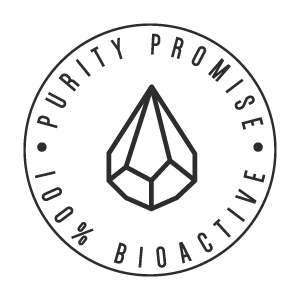
At Green Envee, we know the highest quality ingredients don’t simply come from a bottle, but instead, begin with the seed. Cultivating the finest plants depends on a keen awareness of the growth process: seed, soil, climate, expert farmers & crafters, and harvest. Only plants meeting our stringent criteria are skillfully extracted to create the highest quality products. When you see our Green Envee label, you know you’re receiving years of commitment and dedication to creating the purest ingredients. You don’t just have our word, you have our PURITY promise.
Proper Seed Choice.
We begin with verified non-GMO, genus specific, and heirloom variety seeds. Wild grown plants are carefully quality tested for hybrids or contamination.
Ultimate Climate for Growth.
Plants best thrive in their native soil, climate, elevation, and region. We ensure our plants grow where they have the best conditions to thrive.
Responsibility for the Environment.
We work with expert botanists, farmers, and artisan wild crafters to maintain fair-trade practices and sustainability with a commitment of respect for the Earth.
Integrity of Cultivation.
We work with a variety of expert botanists, artisan farmers, and fair-trade wild-harvesters for their expertise with specific plants. By visiting their farms and creating relationships with the cultivators, we ensure that our standards of quality are met.
Tested for Trusted Quality.
All of our essential oils undergo gas chromatography/mass spectrometry testing by organic chemists and scientists to guarantee quality. You will never find fillers, synthetic oils, contaminants/toxins, or artificial fragrances in our products.
Yielded for Highest Therapeutic Response.
Careful consideration to the seed, growth environment, harvest, and extraction means you’ll receive the maximum therapeutic benefits from the essential oils in their purest form.
How do you know your essential oils come from quality plants?
At Green Envee, quality begins with the seeds and soil. We maintain relationships with expert botanists, artisan farmers, and fair-trade wild-harvesters around the world to ensure each plant begins with non-GMO, genus specific, and heirloom variety seeds. We even test Mother Nature’s wild-grown plants to ensure that they are free from hybrids or contamination. Likewise, the soil is monitored to assure that it is free from toxic pesticides and fertilizers, and that it does contain essential mineral and pH content for optimal growing conditions.
Are all of your plants grown locally?
As much as we would love to grow citrus trees in our backyard, the harsh Chicago winters wouldn’t produce the best quality fruit. Every plant and flower has specific temperatures, regions, elevations, and even soil pH in which they best thrive. We’re committed to sourcing plants that have grown in conditions best suited for their highest quality. Our trusted relationships with expert botanists, artisan farmers, and fair-trade wild-harvesters around the world provide regional expertise in specific harvesting needs.
Isn’t harvesting plants the same for every plant?
Not at all! In fact, each plant has specific needs: harvesting sturdy bark is vastly different from stems, leaves, or delicate flowers, for example. Season, weather, and time of day play a role in harvesting. Even the moon’s cycle and gravitational pull affects proper harvesting time to enhance the plant’s natural properties.
Does it matter how the essential oils are extracted from the plant?
Absolutely. Precise knowledge of time, pressure, and heat of steam distillation make extracting essential oils an art in itself. Rushing this process diminishes the purity of the essential oil; quality takes time and patience. With this extra care, 1 drop of essential oil equals approximately 75 cups of that particular botanic tea. Extracting essential oils through this long and slow process offers the highest quality resulting in the greatest therapeutic benefits. Citrus oils are cold pressed with the same commitment to quality while extracting the essential oil from the peel.
Does “pure” and “quality” mean the same thing?
Not exactly. You may have an essential oil that is pure in terms of no added fillers or synthetic oils, but improper distillation or poor growing conditions may result in lower quality or contamination. Think of it as you would diamonds. You may have a true diamond, but the cut, clarity, color, and carat determine its quality. With essential oils, the quality is indicative of its soil, seed, harvest, distillation, and storage.
You mentioned testing, what kind of quality testing do you use?
Before any batch of essential oils is accepted by Green Envee, we test for quality with Gas Chromatography (GS)/Mass Spectrometry (MS). In essence, organic chemists and scientists test each batch of essential oil for contaminants or impurities by separating the oil into individual molecular compounds. Then, the results are analyzed by measuring the molecular weight after the molecules have been ionized. The mass spectrometer (MS) measures the chemical constituents and compares them to a spectra database. Although this testing can be costly, it is an important process for quality assurance.
Is the bottling of an essential oil important?
Storage of essential oils is an imperative part of maintaining quality. While essential oils should be kept out of direct sunlight, a dark bottle helps reduce all negative light effects. Regardless of the color of glass, all essential oils should be kept in glass bottles. The package label can also provide important information. Ideally, the essential oil’s botanical/Latin name should be listed. While there are many common names for plants, the botanical name ensures that you’re using the proper genus species for aromatherapy benefits. Some labeling may indicate the location of plant growth showing that it was grown in its native soil.
What are the FDA guidelines for rating the quality of essential oils?
Currently there are NO FDA regulations, or grading systems, pertaining to essential oils. Although quality GC/MS testing is generally done by third-party scientists, any grade is an internal designation. While there is no universal standard for therapeutic grading, highest quality essential oils will provide greater therapeutic response.
